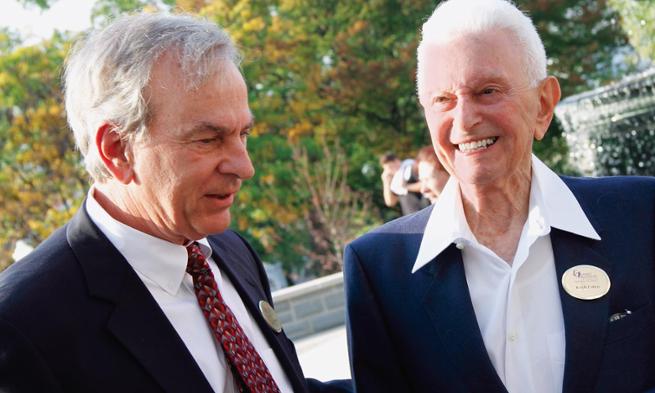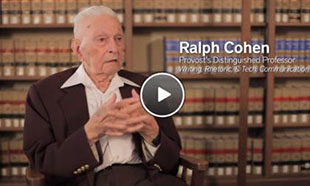Can we handle the technology we invent?
Give
Or is technology handling us? A gift by donor and professor Ralph Cohen will explore critical questions and bridge the cultures of technology and humanism.
Human beings have never been satisfied with the world as nature presents it. We keep inventing things ‚ ways to stay warm, to go faster, to connect. We‚ invented technologies to make life easier and to save it.
Anyone who has watched teenagers sit side by side and text each other on their smart phones, however, has glimpsed one of the more questionable effects of technology on us.
The connection between technology and the human has been an intimate one ever since we first began responding to our external environment, says Larry Burton, director of JMU‚ new Cohen Center for the Study of Technological Humanism. Take, for example, the lever, clothes or toothpaste. Consider cars, drones and buildings. Think of language, abstract concepts, ways of thinking, and societal structures like schools and governments. Technology is anything human-made, all of the things we build for and around ourselves.
All education is for the future.’— Ralph Cohen
The complex questions that arise from this interrelatedness require intentional, rational human study, according to Burton. And investigating the implications of such a broad intellectual landscape requires the input of all the academic disciplines.
That‚ the reasoning behind JMU‚ ambitious new graduate-level Cohen Center, which has been funded by a gift from the internationally renowned scholar and donor Ralph Cohen and his late wife, Libby. The center will operate on the principle that ‚collaborative, networked and shared research that bridges the ‚ two cultures‚ of humanism and technology is of utmost importance as our society becomes increasingly technological, interconnected and global, JMU announced.
Inspiration for the center began with Burton‚ recruitment of Cohen, his former mentor, to teach in JMU‚ School of Writing, Rhetoric and Technical Communication several years ago. Burton knew Cohen as a visionary scholar and eminent literary critic who throughout his professional life has refused to stay in his own intellectual lane.
A former UCLA and University of Virginia professor, Cohen established and then edited for 40 years the respected journal, New Literary History, so named, the founder says, to keep scholars looking forward, not back. A prolific author, Cohen also spent years teaching around the world ‚ in Australia, China, France, Israel, Russia and Scotland ‚ with his wife and intellectual partner of 73 years, Libby, who was a library science scholar and native Russian.
 That‚ in the past, Cohen says. We absorb the past, but all education is for the future. If we do this right, we are going to find out what a new kind of knowledge is. Knowing how fields interrelate is something that a university education should provide.
That‚ in the past, Cohen says. We absorb the past, but all education is for the future. If we do this right, we are going to find out what a new kind of knowledge is. Knowing how fields interrelate is something that a university education should provide.
Nearing 100 years old and impressed with JMU‚ openness to change and fresh thinking, Cohen has found a home for his vision and his passion. I came to JMU to be part of an exciting university, he says. I want to contribute. That‚s all I care about. Two years ago, he donated much of his personal scholarly library, including many rare volumes, to JMU Libraries.
Through his work in WRTC, Cohen has found a university environment with the right ingredients for a donor and scholar to make a difference. He notes the rich undergraduate Madison Experience that has led to a doubling in the last 15 years of the number, and increased prestige, of JMU graduate- and doctoral-level programs.
The center will have a significant impact on graduate education at JMU, says Reid Linn, dean of the Graduate School. The potential is great for collaboration and linking hands across disciplines and fields of inquiry that are not possible today. There will be a physical space and library, which will create a dynamic environment for our graduate students and faculty to meet and investigate significant trends and issues of the day. That exciting.
Traci Zimmerman, interim head of WRTC, imagines the potential impact among JMU graduate scholars in assessment, biology, business, communication sciences and disorders, education, information security, integrated science and technology, music, nursing, and psychology. Think of the expertise the faculty and students in our graduate disciplines can bring to bear on investigations into technology and humanism.
The Cohen Center will be unique in Virginia and sponsor research opportunities, fellowships and speakers. It will be housed in WRTC in the College of Arts and Letters under Dean David Jeffrey.
Technology: Anything human-made
Activities: Research, fellowships, colloquia, symposia, speakersScholars: Graduate faculty, students
Outcomes: A national model of
networked, collaborative and active scholar-citizens
Funded by: A gift from Ralph and the late Libby O. Cohen
Location: School of Writing, Rhetoric and Technical Communication
